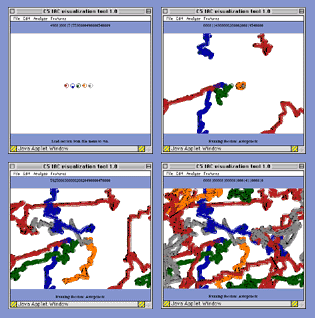 |
Recursive Systems: Tertiary Data Production from Primary Sources
Keywords
association, classification, sequential pattern mapping, time sequence
analysis, symbolic AI, heuristics, neural-net, pataphysics parallel
processor, visual attention trace responses, behavior modeling, IAC
data extraction algorithm complex
Description
The C5-Information Analyst Cell data extraction algorithm complex is a
recursive data mining strategy building on traditional mining
strategies of association, classification, sequential pattern mapping,
and time sequence analysis by overlaying a bio-mechanic heuristics
complex. By supplementing traditional heuristic artificial intelligence
techniques (symbolic AI), and neural-net pattern recognition with
visual attention trace responses from actual human subjects, the C5-IAC
data extraction algorithm complex seeks to isolate finer sets of
sequential, associative and classificatory relationships and improve
the surveillance efficacy of integrated cybernetic systems. IAC
research integrates the application of performative ontologies
generated within C5 theoretical systems as instantiated in the
"thrown" human-machinic processor systems. The thrown data is
represented in sets captured during the function of the theorist
manipulated radio controlled surveillance probes. (The Heideggerian
sense of "thrown" is intended here, not a reference to object
oriented exception handling.) The goal is to examine and map the
feedback loops generated between the cybernetic theorist/RCSP
conflation. It has been speculated that significant patterns that were
not intended or recognized in the algorithmic implementations of the
performances will emerge from these engaged bio-machinic systems
relative to the theoretical content of the previous sessions. IAC
research will show whether or not such patterns exist.
The visualization techniques employed focus on the analysis of positive feedback loops created between interactive probes (RCSP's) and their human collaborators relative to the instantiation of theoretically based cognitive patternings which emerge via extensive, practiced, human/machinic (theorist/probe) interaction. Whereas the theories being instantiated in RCSP activity (Complexity, Autopoiesis, Ubiquity, and Adaptive Learning), are based on complex strategies which require intense concentration and execution on the part of the theorist/operators on a daily basis, the data production strategy implemented as algorithm by the IAC Knowledge Representation Sessions instead focuses on the instantiation of beingness and throwness, forcing the theorist/RCSP cobinations (cyborgs) to use "intuitive" behaviors (unconsciously programmed through practice), in their performance. This tertiary resurfacing of experience is then modeled via the same data mining and visualization methodologies used in the other four sessions and fed back into the mesh for further performance/analysis. Potential applications include population control and modeling, crowd control and modeling, traffic control systems, corporate behavior and market modeling, and consumer behavior modeling.
